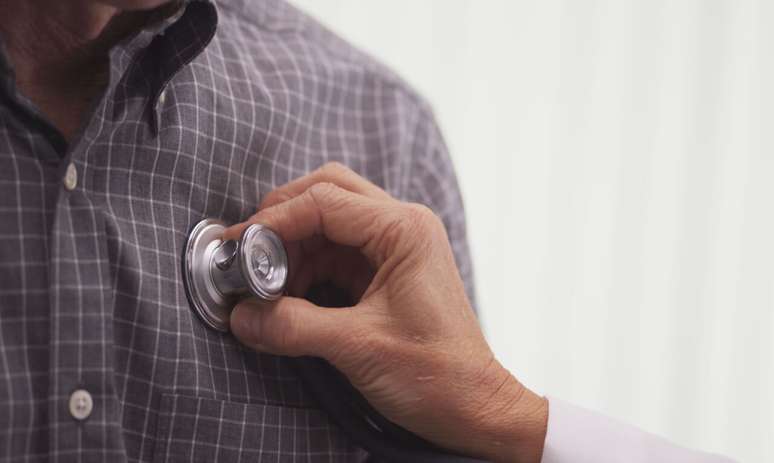In addition to a healthy lifestyle, a cardiological check-up is the best way to monitor and maintain heart health.
The Ministry of Health estimates that 14 million people suffer from heart problems and at least 400,000 die each year. Furthermore, it is worth mentioning that cardiovascular diseases are the leading cause of death in Brazil, accounting for 30% of all deaths in the country. This scenario points to the importance of keeping heart health up-to-date, especially through cardiology checkups.
html[data-range=”xlarge”] figure image img.img-5275e76e82e6c8cd995353d1bd68c051ter7uxsh { width: 774px; height: 463px; }HTML[data-range=”large”] figure image img.img-5275e76e82e6c8cd995353d1bd68c051ter7uxsh { width: 548px; height: 328px; }HTML[data-range=”small”] figure figure img.img-5275e76e82e6c8cd995353d1bd68c051ter7uxsh, html[data-range=”medium”] figure image img.img-5275e76e82e6c8cd995353d1bd68c051ter7uxsh { width: 564px; height: 337px; }HTML[data-range=”small”] .article__image-embed, html[data-range=”medium”] .article__image-embed { width: 564px; margin: 0 auto 30px; }
The cardiologist of the Beneficência Portuguesa hospital in São Paulo, Dr. Marcelo Ferraz Sampaio, explains that the clinical history and physical examination are important to prevent and monitor cardiovascular complications. “That’s because with good cardiac auscultation you can get a lot of information,” he comments. In this phase, vital signs, palpation and auscultation of the pulses, observation of the veins, inspection and palpation of the chest, and percussion are evaluated.
Symptoms that indicate a heart problem
Marcelo recommends seeing a health professional whenever one or more of the following symptoms occur:
- Chest pain;
- Dizziness;
- Palpitations or shortness of breath, usually associated with great physical exertion;
- Night sweats;
- Swelling in the legs which may reflect oedema;
- Swelling in the belly;
- High cholesterol, blood sugar or blood pressure.
The cardiologist also points out that excess cholesterol can accumulate and lead, for example, to the formation of fatty plaques. The consequence is an increased risk of cardiovascular disease.
Risk factors for heart disease
Risk factors vary widely, the practitioner points out. The doctor cites, for example:
- To smoke;
- Excessive alcohol consumption;
- Hypertension;
- Obesity;
- Fatigue;
- Depression;
- Sedentary lifestyle;
- Air pollution;
- sleep apnea;
- thyroid disorders;
- Diabetes (this is because diabetic patients are twice as likely to suffer a heart attack).
Furthermore, genetic inheritance is another aspect that influences the probability of occurrence of the disease. “If the parents manifest these problems early, being men under 50 and women under 60, the child should undergo the examination until the age of 12,” indicates Dr. Marcelo. The doctor also recommends carrying out a cardiological evaluation every five years and reinforcing periodic monitoring, especially after the age of 40.
7 tests present in the cardiological check-up
Due to the intermittent feature of some heart diseases, they may not be identified initially. Therefore, complementary procedures are needed, explains Dr. Marcelo. The specialist lists seven tests that can be done to check the health of the heart:
- Electrocardiogram: monitors the heart through electrodes on the skin, and the electrical signal is written on paper, allowing heart rate analysis;
- Echocardiogram: use sound waves to imagine the heart;
- Myocardial perfusion scintigraphy: detects the radiation emitted by the injection of a radiopharmaceutical, allowing the visualization of the blood flow that feeds the main muscles of the heart;
- Computed tomography of the coronary arteries: uses X-rays to evaluate the blood vessels that supply the heart muscle;
- Rheart sound: uses a magnetic field to capture details of the structure of the heart;
- Exercise test: analyzes how the patient reacts when subjected to physical effort on a treadmill or bicycle;
- Blood analysis: contribute information on dosages of cardiac enzymes and B-type natriuretic peptides (BNP), a hormone that indicates the degree of heart failure and is released from the ventricles when the heart is attacked.
Prevention
Whatever heart care, prevention remains the best way, says Marcelo. In addition to cardiological monitoring, measures can be taken to help maintain a healthy heart rhythm. With this in mind, the doctor gives some advice:
- Turn balanced nutrition into a lifelong habit;
- Exercise regularly. Therefore, choose the activity that is most enjoyable;
- Eliminate smoking and the consumption of other types of drugs;
- Avoid excessive consumption of alcohol, coffee, energy drinks and types of tea that contain a lot of caffeine, such as mate and green tea, for example;
- Control stress and take care of emotional health;
- Get enough sleep, as rest is essential for heart health.
Source: Terra
Ben Stock is a lifestyle journalist and author at Gossipify. He writes about topics such as health, wellness, travel, food and home decor. He provides practical advice and inspiration to improve well-being, keeps readers up to date with latest lifestyle news and trends, known for his engaging writing style, in-depth analysis and unique perspectives.






![[Coluna] Does Brazilian protectionism inspire Trump? [Coluna] Does Brazilian protectionism inspire Trump?](https://p2.trrsf.com/image/fget/cf/774/0/images.terra.com/2025/10/16/2008907400-74231636354.jpg)

